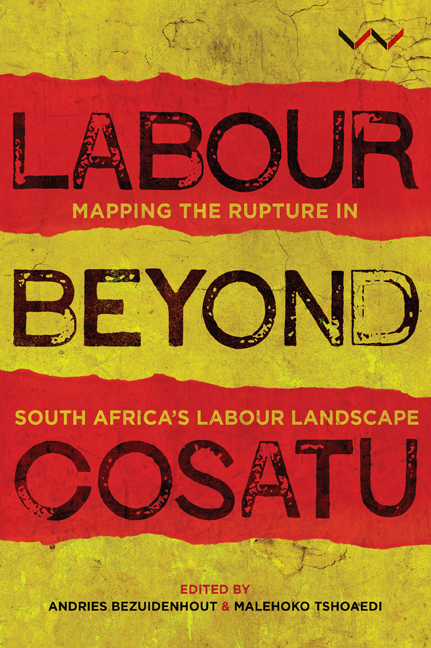Book contents
- Frontmatter
- Contents
- Figures and Tables
- Abbreviations and Acronyms
- Preface
- Chapter 1 Democracy and the Rupture in South Africa's Labour Landscape
- Chapter 2 Research in a Highly Charged Environment: Taking Democracy Seriously, 2014
- Chapter 3 The Social Character of Labour Politics
- Chapter 4 Is Cosatu Still a Working-Class Movement?
- Chapter 5 Labour Aristocracy or Marginal Labour Elite? Cosatu members' income, other sources of livelihood and household support
- Chapter 6 The Politics of Alliance and the 2014 Elections
- Chapter 7 Cosatu, Service Delivery, Civil Society and the Politics of Community
- Chapter 8 The Politics of Male Power and Privilege in Trade Unions: Understanding sexual harassment in Cosatu
- Chapter 9 Internal Democracy in Cosatu: Achievements and challenges
- Chapter 10 Public Sector Unions in Cosatu
- Chapter 11 Are Cosatu's Public Sector Unions Too Powerful?
- Chapter 12 Labour Beyond Cosatu, Other Federations and Independent Unions
- Contributors
- Index
Chapter 10 - Public Sector Unions in Cosatu
Published online by Cambridge University Press: 21 March 2018
- Frontmatter
- Contents
- Figures and Tables
- Abbreviations and Acronyms
- Preface
- Chapter 1 Democracy and the Rupture in South Africa's Labour Landscape
- Chapter 2 Research in a Highly Charged Environment: Taking Democracy Seriously, 2014
- Chapter 3 The Social Character of Labour Politics
- Chapter 4 Is Cosatu Still a Working-Class Movement?
- Chapter 5 Labour Aristocracy or Marginal Labour Elite? Cosatu members' income, other sources of livelihood and household support
- Chapter 6 The Politics of Alliance and the 2014 Elections
- Chapter 7 Cosatu, Service Delivery, Civil Society and the Politics of Community
- Chapter 8 The Politics of Male Power and Privilege in Trade Unions: Understanding sexual harassment in Cosatu
- Chapter 9 Internal Democracy in Cosatu: Achievements and challenges
- Chapter 10 Public Sector Unions in Cosatu
- Chapter 11 Are Cosatu's Public Sector Unions Too Powerful?
- Chapter 12 Labour Beyond Cosatu, Other Federations and Independent Unions
- Contributors
- Index
Summary
INTRODUCTION
Public sector unions have grown in size, power and significance in Cosatu over the past twenty-four years and have instigated two of the largest strike actions, in 2007 and 2010, ever witnessed in South Africa. Cosatu's public sector unions have increased their membership from a mere 7 per cent of total union membership in 1991 to 39 per cent in 2012 (Cosatu 2012: 7). This constitutes a tenfold increase in membership, from 85 000 in 1991 to 854 000 in 2012. According to Cosatu (2015: 4), ‘… union density in the private sector was constant from 1995 to 2005 at 32.4 per cent whilst in the public sector, it increased from 50 per cent to 68.4 per cent.’ In 2013 the contribution of public sector unions to Cosatu's income was 38 per cent. According to Cosatu's financial statements, this proportion rose to 60 per cent in 2014 (Marrian 2015). This is in part due to the expulsion of Numsa from Cosatu and the decline of the NUM as members defected to Amcu, but also to an increase in the membership of public sector unions affiliated to Cosatu.
The perceived dominance of public sector unions in Cosatu has already led to anxieties and tensions, illustrated by the response by Nehawu to the ANC secretary general Gwede Mantashe's statements made at the national congress of the NUM in June 2015. Mantashe had reportedly said that ‘the federation's dominance by public sector unions would turn Cosatu into a yellow federation’ and, quoted directly, that ‘[o]nce you have a federation that is dominated by the public sector, then you are in trouble’ (Nehawu 2015). (The term ‘yellow union’ typically refers to unions set up by authoritarian states to do their bidding and to pre-empt real independent unions from emerging. The term was specifically used during the Cold War, when many such unions were funded by the Central Intelligence Agency (CIA) of the US government, often in anti-communist East Asian countries.) Gwede Mantashe urged Cosatu ‘to focus on recruiting more industrial workers’. Nehawu spokesperson Sizwe Pamla, who later became Cosatu's spokesperson, wrote in a press release: ‘The problem with this statement is that it reduces public sector unions to unreliable and ahistorical organisations and sets the workers against each other … In fact, it's the role of Cosatu to dominate all sectors of the economy including the public sector.
- Type
- Chapter
- Information
- Labour Beyond CosatuMapping the Rupture in South Africa's Labour Landscape, pp. 170 - 190Publisher: Wits University PressPrint publication year: 2017



